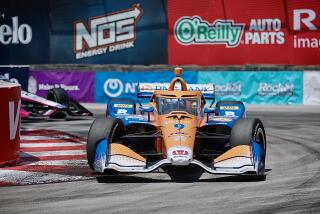24 Hours of Le Mans : Porsche Turns Back Challengers
- Share via
LE MANS, France — World endurance champions Derek Bell of Britain and West German Hans Stuck, along with American Al Holbert, won the 54th Le Mans 24-Hour endurance race Sunday in their factory Porsche 962C. The race was marred by the death of Austrian driver Jo Gartner.
It was the fourth Le Mans victory for Bell, who said it was “one of my best races here, in a fantastic car.” The triumph was the second for Holbert and the first for Stuck.
“The big shadow over the win is the loss of our friend Jo Gartner,” said Stuck, who regularly raced with the 32-year-old Austrian in the United States in the IMSA series and won the Sebring 12 Hours with him this year.
Shortly before the halfway point, about 3:15 a.m. Sunday, Gartner’s Porsche crashed at a high speed, turned over and burst into flames, injuring him fatally. The cause of the accident was not known.
That put the race under the yellow flag for some 2 1/2 hours, ending a long battle between the Bell car and the private Reinhold Joest team Porsche that won the last two Le Mans races, when its engine failed.
Challenges to the long Porsche supremacy at Le Mans by the Jaguar factory and the Mercedes-engined Sauber team failed, as did efforts by Japanese Toyota, March-Nissan and Mazda teams.
Porsches finished in nine of the top 10 places, including the first four-wheel drive car to race here.
The winners covered 3,089.99 miles at an average speed of 128.75 m.p.h., slow because of the long caution period.
Second, eight laps (67 miles) back, was the Brun team car driven by Argentine Oscar Larrauri, Spain’s Jesus Parera and France’s Joel Gouhier.
After a shaky start that saw it down to 21st place, the “Spirit of America” Porsche, painted as the Stars and Stripes and manned by Americans George Follmer, Kemper Miller and John Morton, finished third.
From the start, the private Porsche, seeking a third straight victory in the race, fought a close battle with the two top factory cars. The Joest team’s model was driven by Germans Klaus Ludwig and John Winter with Italian Paolo Barilla, the 1985 winning crew.
They swapped the lead with the factory cars during pit stops, running at record speeds with a 15% higher fuel allowance than last year, on a slightly modified, faster, track.
Backing the Bell-Stuck-Holbert car was the pole position factory car. Drivers Jochen Mass of Germany and Bob Wollek of France were joined by Australian Vern Schuppan after his experimental double-clutch Porsche broke down.
The biggest challenge this year was from Jaguar. The conventional V-12 engined cars ran as high as fourth, fifth and sixth in the early hours.
But by 9 a.m. Sunday, the Jaguar pits were empty, spray-painted with slogans for the massed British fans: “Thanks for coming--we will be back.”
One Jaguar stopped on the track with fuel problems and a second had drive-shaft failure at high speed. The third, driven by Britain’s Derek Warwick, American Eddie Cheever and France’s Jean-Louis Schlesser, was running second, nine laps behind the Porsche, early Sunday.
A tire exploded on the straight, and though Schlesser got back to the pits, there was too much damage to the rear suspension and gearbox to repair the car.
After seven hours, the Joest team and the two factory Porsches still were on the same lap and for four hours, the Joest and Bell cars ran nearly together except for pit stops, drafting each other to save fuel.
“It was tremendous racing, but it got a bit dangerous at times,” Bell said.
Holbert, from Warrington, Pa., described it as “more fun than in 1983, because we could run harder, and it was exciting at night battling with No. 7 . . . good fun.”
They were still only a couple car-lengths apart after nine hours and 1,250 miles of racing.
The Joest car set a lap record for the new circuit design with a 3:23.30, an average speed of 148.85 m.p.h.
Gartner’s accident ended the duel. The cars ran slowly behind a pace car for 2 1/2 hours as track workers cleaned up the debris and replaced long sections of guard rail damaged by the Porsche.
Under the conditions, the Joest car’s engine ran too cold, was damaged, and Ludwig pulled into the pits and retired.
The Bell-Stuck-Holbert car found itself nine laps--about 70 miles--in the lead, needing only to maintain a steady pace to win.
“The hardest part was waiting for the end, from 6 a.m. until 4 p.m.,” Holbert said, “hoping nothing would give. But I never had such a race, where the car was as good at the end as at the beginning.”
Just before the accident, Mass in the other factory Porsche was caught out by a slippery patch of track, and spun into a car which crashed moments earlier, damaging the front suspension too badly to continue.
Never lower than eighth, the Brun car moved up during the night as Larrauri drove particularly fast, to contest second place with the Jaguar.


